Despite a lengthy hiatus somewhere between Holidays in Eden (1991) and Marbles (2004), I regard myself as a longstanding Marillion fan. Their music meant a good deal to me as a teenager, and, since rediscovering their back catalogue just prior to the release of the aforementioned Marbles, some of their music has come to mean a great deal to me as an adult. No surprise then, that Marillion feature heavily in Words and Music, which attempts to explore the kind of significance that rock music can have for people.
It was great to see Marillion picking up the ‘Band of the Year’ award at the 2013 Progressive Music Awards – an accolade, which, from whatever source, many fans will argue is long overdue. It was also an absolute pleasure to speak with keyboard player Mark Kelly recently about demons and wizards, notable gigs, sympathy for the devil and meaningful music. Read on to find out more …
Hi Mark, congratulations on the award, it must be nice to get the recognition?
Yeah, though it’s funny because we’d sort of got used to never winning anything! Even when we were in the charts, when ‘Kayleigh’ was a big hit and we were considered to be a big band, we never used to get invited to any of those award things like the Brits, so we just felt like we were not part of that thing, you know. 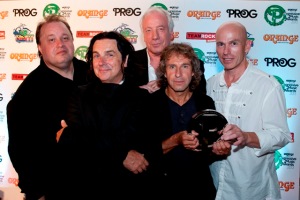 Not that it ever bothered us much, but to finally win something was like, “Oh, we’ve actually won”. We were up for four awards and we won the band of the year, which was great because it’s nice to be recognised by your peers. And it was a good night out!
Not that it ever bothered us much, but to finally win something was like, “Oh, we’ve actually won”. We were up for four awards and we won the band of the year, which was great because it’s nice to be recognised by your peers. And it was a good night out!
And, of course, it was a Prog Award, the ‘P-word’. It’s a perennial discussion among fans isn’t it, the extent to which Marillion are a prog band?
Well, things have sort of changed over the last few years, the fact that there is the Prog Awards for a start. This is the second year they’ve done it now, and I think Jerry Ewing with his idea of having a prog magazine … I think that was a stroke of genius because, you know, it sells well, there’s a lot of people out there who for years have been listening to progressive music, whether it’s the old stuff or more modern stuff, and there’s been no outlet or recognition of the fact that people do listen to this music. I don’t know what’s happened over the last ten years or so, but gradually … prog’s not such a dirty word anymore. People are happy to come out and say, “I’m a prog fan.” I mean, even pop musicians or indie musicians or whatever will come out and say, “Oh yeah, I like Genesis” or Pink Floyd or whoever. And there’s no stigma attached to it anymore, which is great.
Yeah, I remember the Manic Street Preachers making public the fact that they were Rush fans.
[Laughs] There you go, yeah! And I think it’s a good thing.
There was a time, wasn’t there, when the band were a bit wary of the prog label?
Well, only because of what it stood for really, which was, you know, dinosaurs and stuck in the past and all the rest of it, but we didn’t see ourselves like that. What’s weird, I suppose, is the association with demons and wizards and fantasy and fiction. I think part of the blame for that has to lie with some of the very early prog bands, the innovators , like King Crimson – their lyrics were quite demons and wizards weren’t they? And then you’ve Yes, whose lyrics you can’t make head or tail of, and, you know, even Genesis had a kind of fantasy slant to their lyrics, so you can see why that association is there. Of course, calling ourselves Marillion … [Laughs].
But because we came along after punk had happened, and, you know, lyrically bands were being much more down to earth and gritty, and singing about real life, that was part of our heritage, if you like. Fish’s lyrics tended to be more like that and less … well, apart from ‘Grendel’ I can’t think of anything else that he ever wrote in that sort of vein really.
So is it a sensible question to ask how you do view what you do as a band?
Well, I’d like people to approach our music with an open mind, obviously. Personally I think we’re definitely in that area – prog, if you like, or progressive music – though there’s a lot of cross-over with pop music for some of our songs and heavy rock for some of the others. I’d just like to think that we’re covering new ground with the stuff that we do and that we’re not just churning out rehashed chord progressions from other songs, and that we’re moving on in what we say, musically and lyrically. But it’s not a good thing to pigeon-hole things, that’s what I’d say.
How about your own route into music, then? Who was the first artist to make an impression on you?
I started off listening to music when I was about nine or ten, and the stuff I listened to was, I suppose, what you’d expect a pre-teen to listen to in the early ʾ70s – Slade, Sweet, T-Rex and stuff like that. So I was a bit of a music fan but not really into it, you know, and it was only when I heard Yes for the first time, and Rick Wakeman in particular, that I was suddenly hooked on music in a way that I hadn’t been before and decided that I wanted to learn to play the keyboards. So I suppose that was the turning point for me, where I went “I’m really into this”, and then from there I discovered all the other bands that were playing in the same genre like Pink Floyd and Genesis and so on, so that was what I grew up listening to in the ʾ70s.
You were self-taught weren’t you? I always think that’s impressive with a keyboard player.
Yes I was, yeah. But like I said, it was just because I heard Rick Wakeman playing and thought, you know, that’s what I want to do … and I’ve never had the same feeling about the guitar or the drums or whatever. I suppose everyone has their own reason for starting playing and for me it was that.
I had a keyboard for my eighteenth birthday, and the inspiration for that was the Script for a Jester’s Tear album and Jon Lord’s playing with Deep Purple but … I didn’t get quite as far as you!
Funnily enough, I was having this conversation when I met Rick Wakeman. I have met Rick before, but I was chatting with him and his son Adam at a Travis gig. Adam was playing keyboards with Travis and Rick was there backstage. And because I’ve never really spoken to him properly I went up to him and I said, “Look, I just wanted to say that you’re the reason I started playing keyboards.” And Adam, his son, said to me, “You’re the reason I started playing keyboards; I didn’t listen to my dad at all!” [Laughs] That was quite cool.
Jon Lord? Yeah, again, for organ playing you couldn’t touch him really. The sort of bands that I started off playing in tended to be on the heavier side, and so you had to do that distorted organ thing to get heard, you know, up against the guitars. So Jon Lord definitely showed the way – how to play keyboards in a hard rock band.
Can you tell us about an album, song or lyric that means a lot to you?
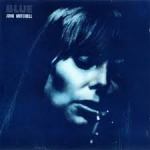 I suppose for lyrics it has to be Joni Mitchell and the album Blue. It’s purely about the lyrics really, and what she’s saying in those songs. The music’s quite simple and nothing gets in the way. They’re great songs.
I suppose for lyrics it has to be Joni Mitchell and the album Blue. It’s purely about the lyrics really, and what she’s saying in those songs. The music’s quite simple and nothing gets in the way. They’re great songs.
But as a personal thing, funnily enough, the album Beautiful Freak by Eels. I was just getting together with my current partner, Angie, when it came out. We’ve got three kids together and have been together now for, what is it, about 14 years, so that album for me was quite a personally important album. I’m sure everyone’s got the same story – the album you were listening to when you first got together with your ‘significant other’. So, that’s the one I’d pick out for that reason. Though it’s an interesting album in itself, a bit retro sounding, and it’s got some interesting songs on it.
 I don’t know it actually.
I don’t know it actually.
Ah ! Well, they’ve done a few albums, but I think, sadly for them, that was probably the high point. It was their first album and I don’t think they managed to do anything that was as good as that. And it did stand out at the time as being quite different from what else was going on. Yeah, check it out, it’s good.
Do you remember the first gig you went to?
Yes, I do. It was at the Marquee Club in London and it was a band called The Loving Awareness Band. I went to see them because Radio Caroline, the pirate radio station, were promoting the band and an album they’d put out which was very Beatle-esque sounding. They were just playing it to death! I’m not sure what the connection was between the band and the radio station, but it was one of those things where I got into the songs and heard they were playing at the Marquee. I’d never been to the Marquee Club before – I was about fifteen – and I went to see them play and they were great. But what I found out a few years later was that the entire band was The Blockheads. It was basically The Blockheads without Ian Dury, before they got together with him.
What’s the most memorable gig you’ve been to as a fan?
Well, probably, because at the time it had such a big impact on me, Pink Floyd, The Wall, 1980. I was still quite young, hadn’t been to many gigs, and that was a huge spectacle, really. Roger Waters has just been out with it recently. Ian [Mosley], our drummer, went to see it and said it was amazing. It sounds like it was exactly the same show as they put on 30 years ago. At that time it was just head and shoulders above everything else that was going on at gigs. And it really did make a big impression on me.
That links quite nicely with a question I have about the relationship that Marillion have with their fans. That whole ‘alienation’ thing with The Wall …
Yeah, Pink Floyd went like that … I don’t know really what was going on with Roger Waters, but I did read that there was some horrible incident at one of their gigs where the fans were all fighting and some people were killed and it made him not want to play gigs anymore. And of course, his whole life story about his father being killed in the war, and growing up with an ‘over-smothering mother’, which seems to be what comes across in the lyrics as the inspiration for that album.
But yeah, our relationship with our fans obviously is totally different to that. Some bands just have that thing where they go, “We don’t want anything to do with our fans.” I’ve spoken to quite a few people about that. Rush, for example – they get up there, they do the gigs, and they don’t really want to have any social interaction or talk to their fans, you know. Pink Floyd are the same. Tony Hadley, from Spandau Ballet, I was talking to him a couple of months ago and he said, “I don’t ever spend time with my fans.” He said, “I was with Fish and he invited loads of fans back to his hotel. I couldn’t believe it! ” [Laughs]
So it’s just, you know, that people are different. I can respect the fact that if you’re a musician or an artist, and you just want to make music, you might not want to deal with everything that goes with it. That’s your choice, but for us … we’ve got great fans, so why wouldn’t you want to get to know some of them? Why wouldn’t you want to hear what they’ve got to say? Why wouldn’t you want to interact with them? And the internet has made it so easy for that to happen. Surprisingly, we don’t get hassled by people. I don’t think we do, anyway. I think we’re at the stage or the size where it’s not such a problem. I can understand if you’re Madonna or Robbie Williams or somebody like that, there’s no way you can just open your doors to people or let people get access to your phone number or your e-mail address or whatever, because there would just be too many. But for us it’s not such an issue.
Mind you, I can’t think of any other group of people in their forties and fifties who are so fanatical and so attached to a band as people are to Marillion.
I know, and I’m very grateful for it. We all are. We all think it’s amazing and we never take it for granted. But on the other hand, it’s really hard to explain. We don’t know the reason. We just write the best music and lyrics that we can and we just go out there and play it as best we can and everything seems to follow on from that, you know. But to be able to say okay, if you’re a band this is what you need to do to have a fan base like Marillion … I wouldn’t know what to tell you. It’s something for which we’re very grateful. We’ve got a cult following, we’re a cult band if you like, and we’ve managed to maintain a level where it’s still working for us and our fans are still there coming to see us play, which is great.
Have you had any particularly strange encounters with fans?
[Laughs] I’m trying to think of something and I can’t think of anything to tell you … um, no … there’s nothing that springs to mind … no. There’s probably something, but right now I can’t think of anything.
What’s the best or most notable gig you’ve played as an artist?
That’s quite tricky, actually. I suppose the stuff that sticks in my head would be when we did South America for the first time and we were playing football stadiums. It wasn’t just us, it was a huge line-up. We were second on the bill to Bon Jovi when they were really huge, and Bob Dylan, and just because of the sheer size of the gigs, they were really memorable. And the audiences were really enthusiastic as well – they tend to be in Latin countries, quite hot blooded! Mexico City, we’ve done some really great gigs there as well. Closer to home, from the early days, I always loved doing the Hammersmith Odeon, as it was then. When Fish was in the band we used to play there quite often, and the early Marquee gigs were great as well. So, you know, throughout our careers really there have been so many really good ones. We’ve played probably a few thousand, so I suppose there’s going to be some in there. Although most of the time we come off stage going, “Aw, that was terrible.” [Laughs] It’s quite rare for it all to come together, but when it does, when we all feel that we’re on top of it, when we’re all playing well and working well together, and the audience is great, you know, then it’s really special.
Gabriel or Collins?
Gabriel, definitely. There’s just something more interesting about Gabriel. Collins? I dunno. As a drummer he was great – it’s a bit sad he can’t play anymore – but as a singer he never really moves me, you know. There’s something about the quality of a voice that’s really important to me, even more than the words, actually.
Schenker or Rothery?
Schenker or Rothery? [Laughs] I used to think UFO were … did Schenker even play on that live album, Strangers in the Night?
Yeah, he did
Yeah? Then I’d have to say Schenker! [Much laughter] I do love playing with Steve because he is a really great guitarist. But they’re totally different to be honest, as players, so that’s how I’d put that one.
That was a ruse really. In the back of my mind I remember you saying something once before about Michael Schenker or Strangers in the Night.
Well, funnily enough I listened to that album again recently on Spotify. And that’s why I mentioned it again. Not that I’m listening to it constantly, but it’s one of those albums you come back to now and again and think, “That’s a bloody great album!”
Sex, drugs and rock ‘n’ roll – jaded stereotype or the meaning of life?
Who was it who said, “Well, I could do without the rock ‘n’ roll!” [Laughs] I think it is a bit of a jaded stereotype. It was Ian Dury who said it originally. Or maybe it wasn’t him, but he wrote the song. For some people I suppose it is the meaning of life, but maybe not all three, and maybe not all at once. Next question!
I don’t know if you’ve seen these documentaries that the BBC roll out about progressive rock every now and then, but they trot out a few generalisations, you know, that it’s all about dragons and wizards, and that progressive rock musicians are frustrated jazz musos who should have kept away from rock and roll. What do you say to that?
Well, I think I know what you’re talking about, where they get a few people on to be talking heads going on about it, and, you know … Ian Anderson talking about how he wore a cod piece and all that. And yeah, it’s all a bit too … I dunno … prog rock for people who know absolutely nothing about music! I have to disagree with the “frustrated jazz muso” thing though, because, well, for me certainly, jazz was never anything that interested me. I think it’s probably people that get bored with your standard pop songs, or even your standard rock songs, people that have a low attention span or people who don’t like repetition too much, you know. So you sort of go, that’s fine, we can do these three chords again and again, but why don’t we try some others, you know, or we can do it in 4/4 but it would be good if we switched the time signature half way through. I mean I’m definitely of that side of things rather than being into jazz at all. Steve Hogarth takes the mickey out of me if I mention that we need to put a change in there. He goes, “You get bored with things so quickly, why do I have to change it?” [Laughs] So there’s definitely a bit of that, certainly for me anyway. I just think it’s about making music that interests you really, and, you know, for some people the music can be just about the feel, so they can just play the same thing over and over again, and do stuff that’s very repetitive and, you know, dancey or trancey or druggy or reggae, whatever it might be. Personally I can’t understand why people would want to play, you know, boogie woogie piano, for example … because isn’t it just the same thing over and over again, variations on the same thing? So whilst it’s clever and probably fun to play, it doesn’t really interest me, you know.
I’ve got a question here – rock music: a force for good or the spawn of the devil? That’s more relevant really to the kind of rock music where you sometimes get supernatural or devilish themes. It wasn’t something I was going to ask you at all until I noticed that someone had got to my website via the search term ‘Marillion devil’s music’.
Funnily enough, I saw that question on your sheet, and I entered that search term into Google just before this interview. It took me to a website that had an interview with Richard Stanley, who was the director of our Brave movie. I didn’t know this, but apparently he basically said, “I disown that piece of work because they took what was a short piece of film and turned it into something much longer.” I suppose there is some truth in that, in the sense that he was working with a very small budget – I say “small budget”, it was about £100k – to try to make a movie that covered 70 minutes, which is the Brave album. It was more than the budget could cope with, if you know what I mean. But anyway, I think working with Richard Stanley is probably the closest we’ve ever come to devil’s music [Laughs] – he’s definitely got a bit of the devil in him, cos he’s made some really dark films. He did a movie called Dust Devil – that’s probably why the search took me to that site, actually, the word connection there – which is just horrible. And he did another one called Hardware, which again is horrible. So yeah, quite a dark person and that’s the closest I think we’ve come to the devil … we’ve got nothing to do with devil’s music …
… No! Actually, there was a book in the ʾ80s, called Paint It Black, I think, that was written about rock and roll being the devil’s music, and there’s a whole chapter dedicated to Marillion, because around about the same time – it was when we were on tour in America in about 1986 – there was a case in the UK. They called it ‘The Vicarage Rape’.
Oh yeah, yeah, I remember!
The story was, from memory, some guys broke into a vicarage, tied up the vicar and raped his daughter in front of him and her boyfriend. What happened was that the daughter who was raped said that one of the guys had a tattoo on his hand with the letters ‘MAR’ and a web between his thumb and his index finger. Some bright spark journalist put two and two together, came up with five, and said, “Ah, it’s probably something to do with Marillion.” So, the papers ran a whole story about it. We were contacted by the police and they said, “Look, we don’t think it’s anything to do with Marillion, but if the press contact you and ask you about it please talk to them because the more it gets written about, the more likely it is for somebody to read this who knows who the tattoo belongs to.”
So that was what happened, and obviously because of that story the guy who was writing this ‘devil’s music’ book said it was something to do with Marillion, and they’ve got a song called ‘Assassing’, and all that sort of thing. We got a whole chapter because of that very weak connection to that terrible case, which of course was nothing to do with us or our music. It was just bad journalism, basically, scraping together some stories that they could use. They’ve got this premise and then they try to find evidence to back it up, you know.
Is the rock era dead? A lot of people have said that, including Paul Gambaccini quite recently.
Um … and then punk came along and turned everything on its head for a few years. No, seriously, I can remember having discussions when I was a teenager, you know, when I was 14 or 15, with other kids at school, me saying rock music’s sort of at the end, and then what’s happened, you know, is you had all these different changes. I think it’s certainly quite stagnated at the moment. Whether it’s dead or not, who can say? When you look at it, music, especially Western music, looks pretty unpromising in terms of what you can do with it, if you just break it down and look at the number of notes which are available and the instruments that are available. You’d think that you’d soon run out of things to do – and quite a lot of people have run out of things to do but haven’t said that. But actually, the possibilities are almost infinite, so who’s to say what’s round the corner? Rock music could quite possibly end up in the same niche area as, say, jazz is now, or even classical music to a certain extent, where it’s a historic thing rather than an evolving and modern thing. But right now it’s difficult to say how it’s going to go. There’s definitely some merit in saying that rock music is dead.
I guess the whole way people are consuming music is different. That’s a change I think a lot of traditional rock fans have found it difficult to adapt to.
Yeah, although while I’m sceptical about whether or not we’ll be able to make a living from streaming services like Spotify, as a listener, as a punter, I think I listen to more music than I used to, and I listen to more new music as well because it’s very easy to do so, and you go exploring … “Oh, let’s just check out this guy” … and that leads to that album … “Oh, I’ve never heard them before, let’s have a listen to them”, you know. It’s all so easy to do. Of course, the downside to that is that back in the old days when you bought an album and you spent all your money on it, all your pocket money or whatever, then even if you didn’t like it the first listen, you were gonna give it a bloody good go, because that was all you had for the week you know. So stuff that you might have gone, “Nah, don’t like that” on first listen, by listen 10 you’re going, “This is the best thing I’ve ever heard!” So there’s something to be said for that investment in it making you give it a proper try, whereas if it’s all free and freely available the tendency is just to jump from one thing to the next thing and not really delve in deeply to anything.
And I suppose music that’s more in the progressive area does benefit from repeated listens?
You’re going to benefit from listening to any good music more than a few times because there’s got to be hidden depths that’ll reveal themselves to you after you become familiar with the more obvious parts of it. And that’s not going to happen instantly, because anything that appeals to you instantly is going to get old fairly quickly because it’ll be fairly simple, generally.
Of everything you’ve done so far, is there anything you’re particularly proud of – a song, an album, a particular performance?
 At the risk of being clichéd, I have to say that the most recent album, Sounds That Can’t Be Made, I’m particularly happy with that. And that’s not my standard answer. I don’t usually say that whatever album we’ve just made is the best thing we’ve ever done, because we have made albums and I’ve gone, “I don’t really this album” or, “I don’t really like this song”. [Laughs] And ‘Gaza’, the song … I’m very pleased with how well that’s turned out. If you go back previously, the Brave album, I think, has got something going for it, and while I think it might have lost us quite a lot fans because it was quite “dark and impenetrable”, as it was described by one journalist, the ones who did get it have been more inclined to stay with us. So, yeah, I’m very pleased with what we’ve just done … I say “just”, but I mean the most recent album. It seems like “just” because we’re so slow these days at making albums that if an album’s a year old it’s still quite new. [Laughs]
At the risk of being clichéd, I have to say that the most recent album, Sounds That Can’t Be Made, I’m particularly happy with that. And that’s not my standard answer. I don’t usually say that whatever album we’ve just made is the best thing we’ve ever done, because we have made albums and I’ve gone, “I don’t really this album” or, “I don’t really like this song”. [Laughs] And ‘Gaza’, the song … I’m very pleased with how well that’s turned out. If you go back previously, the Brave album, I think, has got something going for it, and while I think it might have lost us quite a lot fans because it was quite “dark and impenetrable”, as it was described by one journalist, the ones who did get it have been more inclined to stay with us. So, yeah, I’m very pleased with what we’ve just done … I say “just”, but I mean the most recent album. It seems like “just” because we’re so slow these days at making albums that if an album’s a year old it’s still quite new. [Laughs]
When I first got into music, albums did seem to be annual, you know, tour … album … tour … album …
Well, for a short period we were making one a year, round about the late ʾ90s. But even back in our early days, it was still two or three years between albums for us. We just tend not to work at a very fast pace. And that might be a good thing, because we’re still here!
I suppose the end justifies the means, as it were?
As long as people like what we do at the end of it. I suppose if it takes two or three years rather than a year, then as long as people are still there after two to three years has elapsed, I don’t think we should complain.
And finally, what next?
Well, probably another Marillion album in the next two or three years! [Laughs] Outside of Marillion I started a little project a few weeks back with a couple of guys, a bass player called Steve Lawson and a drummer called Roy Dodds. You probably haven’t heard of either of them, but Steve is a solo bass player – he plays a six string bass and uses a lot of different loops and effects and stuff like that – and Roy was the drummer in Fairground Attraction years ago and plays quite jazzy, with a really nice feel to his drumming. The three of us have never worked together before. It was a chance meeting and we said let’s do something together. We just jammed for three days, came up with a load of material, and so between the three of us and Mike Hunter, our producer, we’re going to put together an album from it which, because of other things, we haven’t looked at since. It’s instrumental stuff – it’s not pop music, that’s for sure. Some of it’s a bit weird [chuckle] but some of it is very musical as well. So we’ll see what happens with that.
It was quite nice to do something that was quite instant, more improvising rather than constructing songs, which is where most Marillion music starts off anyway, so I felt quite at home doing that. But rather than going, “Ok, we’re gonna turn this into songs”, it’ll sound more like a soundtrack than a bunch of songs.
On the Marillion front we’ve got some gigs coming up in November [2013]. Just a few shows, about eight or nine shows around Europe … one in Manchester and one in Aylesbury, which is sold out. And then next year we’re doing a cruise with Yes – the ‘Cruise to the Edge’ – which will be interesting, with some other bands as well. It’s like a progressive rock cruise around the Caribbean next spring. In between these things we’ll be starting writing the next Marillion album, but I’ve no idea when it’ll be ready. We might be doing some summer shows and we’re probably going to go to South America in May as well for a few weeks. So yeah, it’s just business as usual in a way, getting out there, doing some gigs, and looking towards writing the next Marillion album while everybody is doing other things on the side.
CHEERS, MARK!
For up-to-date information on Marillion gigs and releases, please visit the official Marillion website.
All live shots of Mark Kelly and Marillion courtesy of Joe del Tufo. Please visit Joe’s photography website.

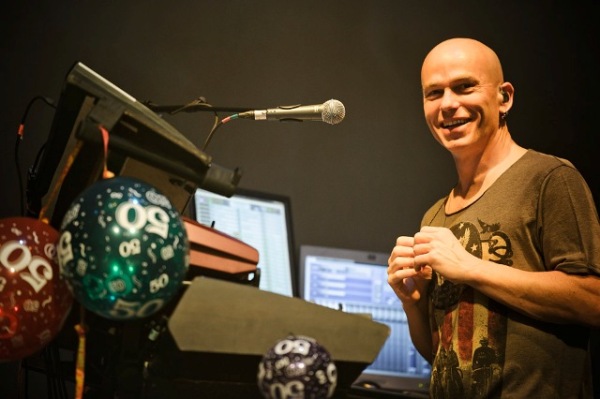
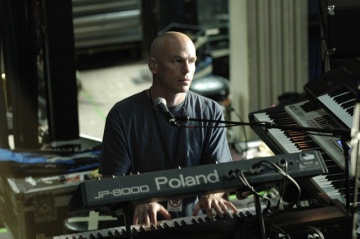
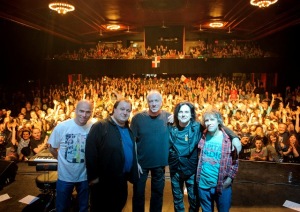
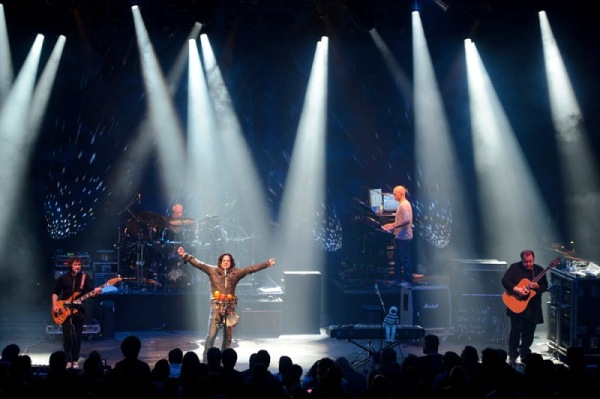
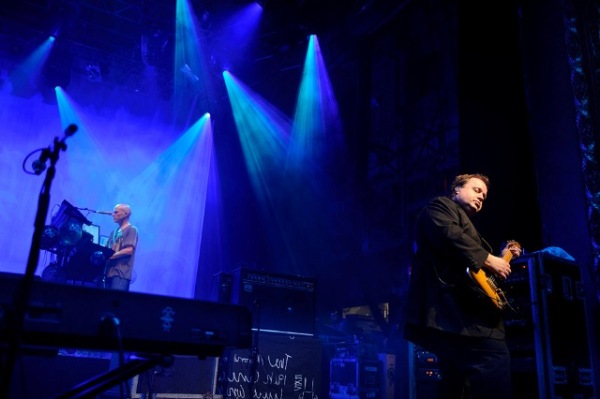
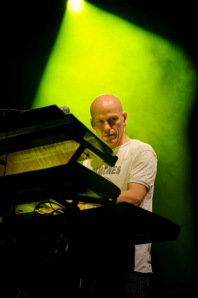
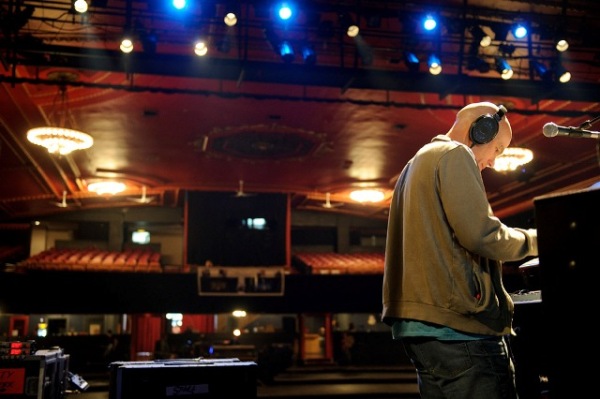
Vasco
/ October 22, 2013A great musician and a gentleman…